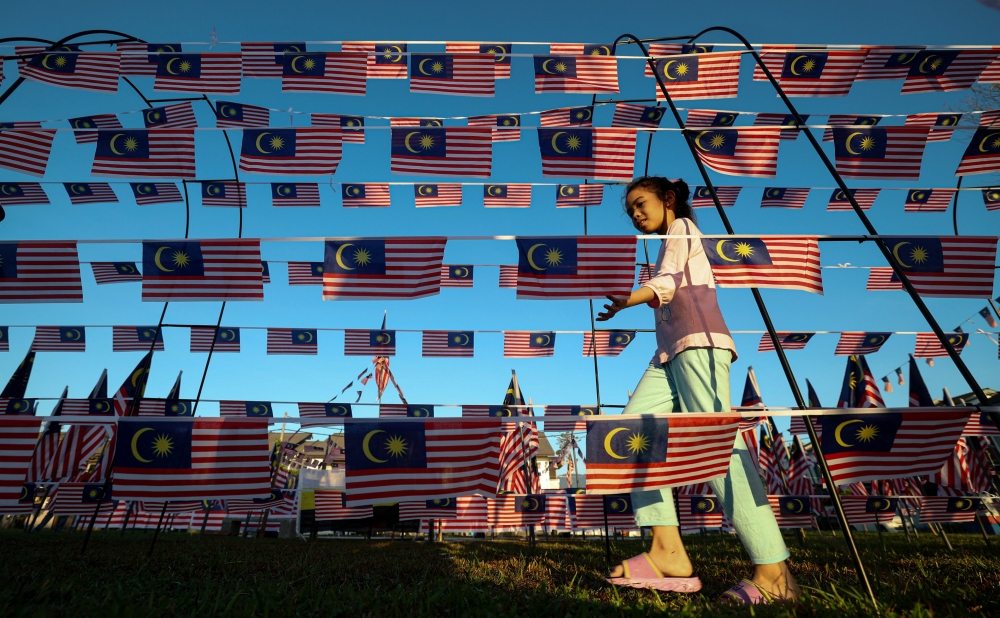
For decades, Malaysia’s existing citizenship laws were seen as unfair and discriminatory against women, as the Federal Constitution only granted automatic Malaysian citizenship to children born overseas to Malaysian men with foreign wives, but not Malaysian women with foreign husbands. — Picture by Firdaus Latif
KUALA LUMPUR, — Constitutional amendments in Malaysia have always been the subject of debate both in public and parliamentary discourse, even more so when it involves rights and privileges such as citizenship.
The federal government’s latest move to amend Malaysia’s citizenship laws follows a prolonged gender equality advocacy to allow Malaysian women the right to confer citizenship to their overseas-born children. A right already granted to Malaysian fathers.
For decades, Malaysia’s existing citizenship laws were seen as unfair and discriminatory against women, as the Federal Constitution only granted automatic Malaysian citizenship to children born overseas to Malaysian men with foreign wives, but not Malaysian women with foreign husbands.
Notwithstanding the progressive change to be introduced, the federal government also intends to introduce several “regressive” amendments — five to be exact — which those opposing have argued would “remove protections against becoming stateless”.
Based on existing court cases brought by stateless persons, they are deprived of access to education, healthcare, employment and business, housing and social security, many of which ordinary citizens take for granted.
Some examples include the ineligibility to open bank accounts, leave and re-enter the country, register for a mobile line, legally marry and obtain a driver’s licence as having a MyKad is the prerequisite to many basic services and facilities.
So what are the proposed “regressive” changes to Malaysia’s citizenship laws?
Under the Federal Constitution, acquisition of citizenship can be obtained by way of verification of citizenship status by Operation of Law (Article 14); by registration (Article 15, 15A and 16) and by naturalisation (Article 19).
Here is a simple breakdown of each amendment and their respective revisions as entailed by civil society stakeholders in their engagements with the Home Ministry.
1. Section 19B, Part III of Second Schedule
Amendment: To amend from citizenship by “operation of law” to citizenship by “registration”.
Effect: Foundlings and abandoned children will no longer be entitled to automatic citizenship.
In the present, foundlings are currently protected by the Federal Constitution as provided under the aforementioned evidentiary provision which gives them the benefit of doubt when the date and place of their birth; and the status of their biological parents are unknown and thus unable to be proven.
The proposed amendment would see foundlings subject to citizenship vested in the Home Minister’s discretionary power and unreasonably place the burden of proof on the child as to his/her parentage.
2. Section 1(a), Part II of Second Schedule
Amendment: To delete the words “permanently resident”.
Effect: Children born to Malaysian Permanent Residents (PR) will no longer have access to automatic citizenship
This means that children born to Malaysian PRs who are stateless will no longer have access to citizenship by “operation of law”.
Marginalised groups such as existing stateless communities of Orang Asli and Orang Asal would also risk entrapment into intergenerational statelessness.
Notwithstanding the progressive change to be introduced, the federal government also intends to introduce several ‘regressive’ amendments — five to be exact — which those opposing have argued would ‘remove protections against becoming stateless’. — Bernama pic
3. Section 1(e), Part II of Second Schedule
Amendment: To amend citizenship by “operation of law” to citizenship by “registration”; repeal Section 2(3).
Effect: Vulnerable and affected individuals — such as children born out of wedlock, adopted and abandoned stateless children; and indigenous communities — will no longer be constitutionally protected against statelessness.
At present, the aforementioned individuals are accorded a pathway to automatic citizenship by “operation of law” but the proposed amendments would see them no longer having said access even though they are born here.
4. Article 26(2)
Amendment: To replace the words “date of marriage” with “date of obtaining citizenship”.
Effect: Citizenship of foreign spouse of a Malaysian man will be revoked if their marriage is dissolved less than two years after the wives are granted Malaysian citizenship.
This amendment will render foreign wives at risk of citizenship deprivation and statelessness as Malaysia does not allow dual citizenship which may result in entrapping these women in a violent or abusing marriage.
5. Article 15(A)
Amendment: Amend and reduce the age limit from “21 years” to “18 years” for the purpose of citizenship registration.
Effect: Stateless child applicants will now have reduced years to apply for citizenship and potentially close out the pathway for stateless children to gain nationality amidst bureaucratic delays and appeals which could take years to process.
By convention, most stateless children apply for citizenship through Article 15(A) as only those below the age of 21 can go through this route.
With tabling for the proposed constitutional amendment expected to take place in the current Dewan Rakyat sitting, a two-thirds parliamentary majority is required for the Bill to be approved as it is a constitutional amendment.
Home Minister Datuk Seri Saifuddin Nasution Ismail had recently sought to justify the proposed “regressive” changes, saying that there were still legal avenues for stateless children to pursue the matter.
In response, civil society groups have called on the federal government to decouple the proposed “one size fits all” package of amendments as it will exacerbate the problem and create a new class of stateless persons in Malaysia.
Amid public outcry, Prime Minister Datuk Seri Anwar Ibrahim recently said the proposed amendments had been presented to the Conference Of Rulers and called for any decision by the rulers to be respected.

